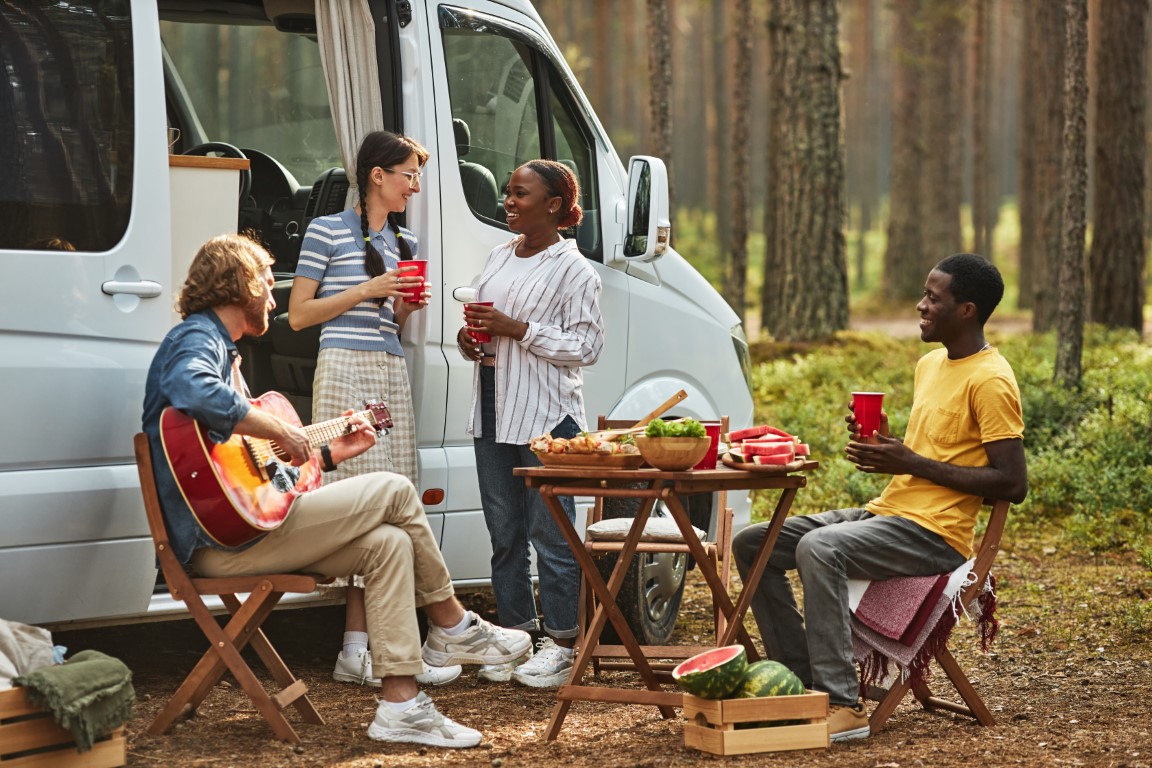15 Step Caravan Safety
Planning a caravan trip this year? Read our updated 2025 guide on caravan safety, including insurance, security, and route planning.

- Thorough Tyre Maintenance: Before setting off, always conduct a detailed check of your caravan's tyres. Ensure they are inflated to the manufacturer's recommended pressure, inspect the tread depth for legal compliance and signs of wear, and confirm that your spare tyre is accessible, in good condition, and that you have the necessary tools and knowledge to replace a tyre if needed.
- Strategic Weight Distribution: Carefully plan your packing to distribute weight evenly across the caravan. This not only prevents instability during travel but also contributes to more efficient fuel usage. Heavy items should be placed low and centred between the axles, while lighter items can be stored higher up.
- Interior Item Securitization: To mitigate the risks of items turning into projectiles during sudden stops, ensure everything inside your caravan is stored securely. Use cabinet locks, non-slip mats, and straps to keep belongings in place. This also helps in maintaining order and accessibility throughout your journey.
- Comprehensive Caravan Insurance: Obtain an insurance policy that provides extensive cover for your caravan and travel needs. Understand the policy details, including coverage limits, deductibles, and exclusions. Regularly review and update your policy to ensure continuous protection against theft, damage, and roadside emergencies.
- Defensive Driving Techniques: Adjust your driving to accommodate the added length, width, and weight of your caravan. This includes leaving ample space for braking, reducing speed in adverse conditions, and being vigilant of the surrounding traffic to respond proactively to any potential dangers.
- Optimized Visibility: Maximize your field of vision by properly adjusting your caravan's mirrors before departure. Consider installing extended mirrors or a rear-view camera system to enhance your ability to monitor traffic and obstacles behind you, which is crucial for safe manoeuvring and lane changes.
- Scheduled Driving Breaks: Long drives can lead to fatigue, which is a major risk factor on the road. Plan to stop every two hours or so for a break. Use this time to stretch, hydrate, and rest, ensuring you remain alert while driving. Pre-identify rest areas along your route for convenience.
- Dimensional Awareness: Being fully aware of your caravan’s dimensions is critical to avoid accidents. Note down the measurements and keep them handy. This information is particularly useful when encountering low bridges, narrow lanes, or tight parking spots, helping you to avoid costly damages.
- Route Mastery: Spend time studying your intended route before departure. Familiarize yourself with the types of roads, traffic patterns, and any potential hazards like steep grades or sharp bends. Use a GPS designed for caravans, which can provide specific information and warnings about the route ahead.
- Emergency Preparedness: Stock your caravan with emergency supplies, including a comprehensive first-aid kit, a reliable fire extinguisher, and a toolkit with a high-visibility vest and warning triangle. Ensure you have enough supplies like food, water, and warm blankets to support you for a few days in case of an emergency.
- Weather Condition Vigilance: Always check the weather forecast for your route and destination. Adverse weather conditions such as high winds, heavy rain, or snow can significantly affect caravan stability and driving safety. Plan your travel for calm weather or know when to delay your trip to avoid dangerous conditions.
- Hitch and Assembly Inspection: Regularly verify the security of your caravan's hitching mechanism. Ensure that the hitch, tow ball, and connections are properly fastened, and that safety chains are correctly attached. Inspect the jockey wheel and the handbrake to confirm they are fully functional.
- Legal Compliance and Education: Stay informed about the towing laws and weight restrictions for each area you'll be traveling through. This includes understanding speed limits, towing equipment specifications, and any additional caravan-related regulations that could affect your journey.
- Routine Caravan Servicing: Keep your caravan in peak condition with scheduled maintenance. This includes checks and services on the electrical systems, brakes, wheel bearings, and external lights. Regular servicing not only ensures safety but can also prevent inconvenient and potentially dangerous breakdowns.
- Caravan Site Research: Before arriving at your destination, research the caravan sites you plan to stay at. Look for reviews on security measures, facilities available, and the site's general safety. Knowing the amenities and layout can also help in planning for power, water, and waste management needs during your stay. Plus, make sure to take everything you need, take a look at our 15 things to take on a caravan holiday.





